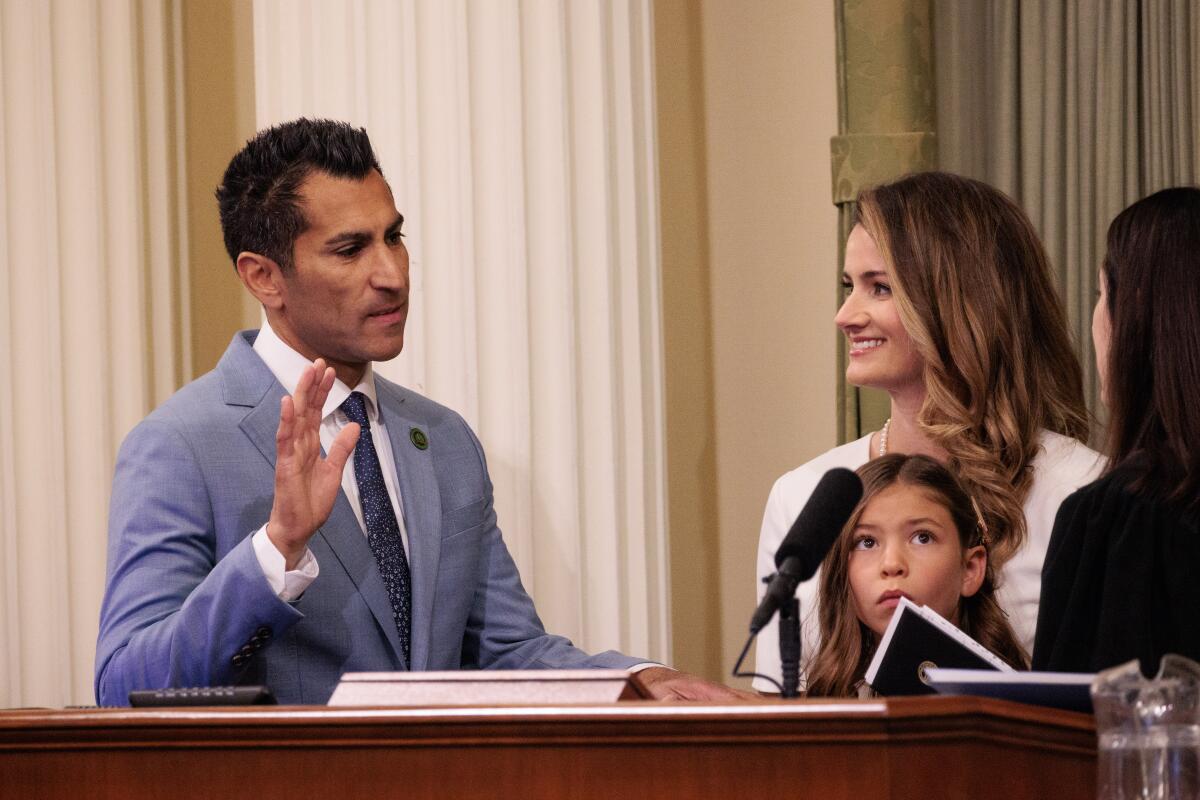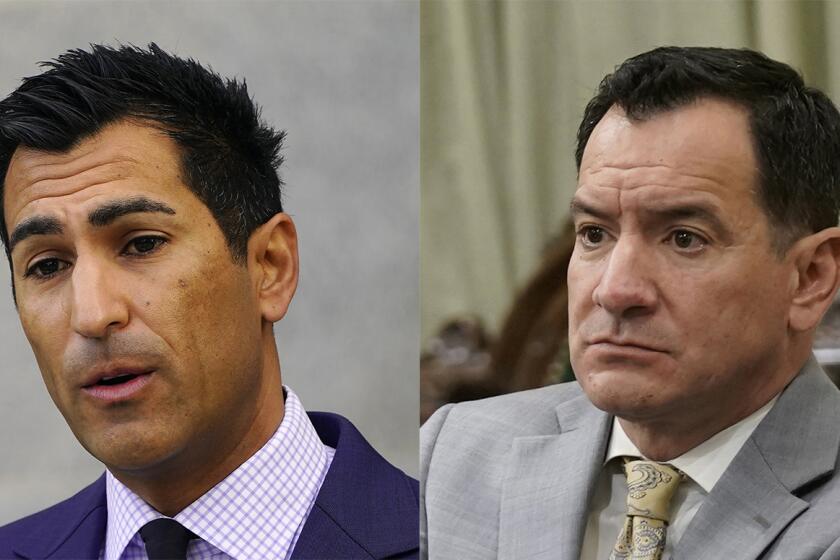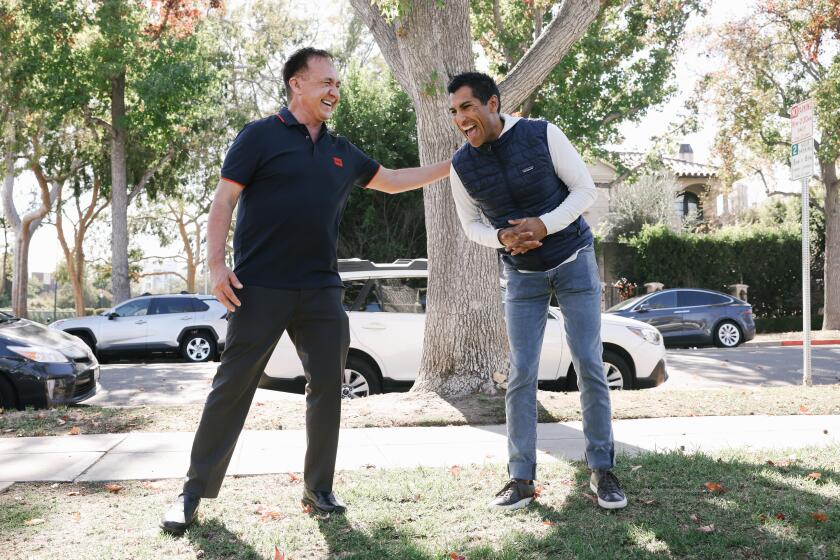Robert Rivas sworn in as California Assembly speaker after long fight for power

SACRAMENTO — An unusually long and tumultuous fight for power in the California Capitol finally came to an end Friday as Robert Rivas was sworn in as speaker of the Assembly, claiming one of the most influential positions in state politics more than a year after he first tried to secure the gavel.
Rivas, a Democrat from Hollister, vowed to usher in a new era of unity following a period in which Democrats were bitterly divided over the Assembly leadership, causing a sense of chaos to fester in the lower house.
“We must work with urgency and unity — unity that is backed by mutual trust and respect,” Rivas said in his inaugural speech. “Today I pledge to you to do whatever I can to reinforce these values. This approach will allow us to make measurable progress on the most critical issues facing Californians, and it will show the rest of the country that progressive government works.”
Rivas highlighted his family’s immigrant roots in his speech, telling the story of his grandfather, Servando Flores, who left Mexico for the fertile fields of California. Flores started off picking grapes, joined the United Farm Workers movement to fight for a union contract, and became a vineyard mechanic.
“My family and I, we grew up in farmworker housing, and today I stand before you as a speaker of the California state Assembly,” Rivas said to loud applause in the Assembly chamber. “That is the California Dream.”
Representing an agricultural swath of Central California rich with strawberry and lettuce fields, Rivas becomes the first speaker in a generation to hail from a rural region. Seven of the last eight speakers were from Los Angeles; the other one was from San Diego.
Rivas “symbolizes the hopes and dreams of all those who toil today in our agricultural fields throughout California, that as a result of the hard work and sacrifices of our parents and grandparents, the next generation can also reach the highest places in the California Legislature,” said Luis Alejo, a supervisor from Monterey County, which lies in Rivas’ district.
Rivas first tried to nab the gavel from then-Speaker Anthony Rendon (D-Lakewood) in May of 2022. But Rendon insisted that the new crop of Assembly members who would be elected that fall should decide the speakership. The standoff led to protracted closed-door negotiations and a deep division between Rendon supporters and those rallying behind Rivas.
Assemblyman Robert Rivas seems to have the upper hand, but Assembly Speaker Anthony Rendon still has the office, writes columnist George Skelton.
On paper, the two men don’t appear very different — both are Latino Democrats and Gen X grandsons of Mexican immigrants. Both men have support from a range of moderate and progressive members of their caucus. The rift was more about leadership style than political differences.
Rivas’ supporters criticized Rendon’s management of the Assembly and believed he was clutching on to power despite having just two years left in office before term limits would force him out. They saw Rivas as a leader for the future.
Rendon’s supporters feared Rivas would be influenced by his brother Rick Rivas’ political connections. Rick Rivas is a vice president of the American Beverage Assn., which lobbies for the soda industry, and has served as a political advisor to Govern for California, a donor network largely made up of Bay Area venture capitalists that seeks to counter the sway that public employee unions have in the Legislature.
The feud spilled into the 2022 election, with Rivas supporters pooling donations into a political action committee to support candidates they hoped would support Rivas for speaker. Rivas traveled the state to stump for them, something customarily done by the speaker.
With a fight brewing over the Assembly speakership, California lawmakers are testing the boundaries of campaign finance law to influence who voters will send to Sacramento.
Days after the November election, Assembly Democrats finalized a plan for Rendon to pass the speaker’s gavel to Rivas on June 30.
The timing makes Rendon the second-longest serving speaker in California history, bested only by Willie Brown, who famously called himself the “Ayatollah of the Assembly” when he was speaker in the 1980s and 1990s. But then voters passed a law limiting lawmakers to just three two-year terms in the Assembly (and two four-year terms in the Senate), leading to an era of high turnover in the speakership.
Voters changed the term limit law in 2012, the same year Rendon was elected, to allow lawmakers to serve up to six two-year terms in the Assembly (or three four-year terms in the Senate). That ushered in a new generation of lawmakers who had time to develop more expertise while in office. Rendon led them with a “decentralized” approach that delegated substantial power to the committee chairs he appointed.
It was a departure from the more autocratic style of prior speakers. As he reflected on his speakership earlier this week, Rendon said he had put up with a lot of stuff, using another word that starts with an “s,” adding that maybe he shouldn’t have been so “overly forgiving” to the members who dished it out.
“I don’t always know that I was as quick to punish as I should have,” he said Wednesday during an interview with the Public Policy Institute of California.
Rendon helped Democrats earn major policy wins, including increasing the minimum wage, strengthening labor protections for gig and farmworkers, launching universal preschool and broadening a program to combat climate change. Lawmakers modified California’s police use-of-force law under his leadership, expanded renter protections and cracked down on predatory lending practices.
Rendon’s most powerful achievement may have been in the political arena, helping to increase the number of Democrats in the Assembly. Under his leadership, Democrats grew to hold three-quarters of the seats, more than the two-thirds supermajority that allows them to pass tax increases and fast-track legislation without any votes from Republicans. The caucus also added enough women and LGBTQ+ members to help the Legislature break diversity records.
But his legacy also includes the chaotic final night of the 2020 legislative session, when he was publicly lambasted and eventually forced to apologize for making Assemblymember Buffy Wicks (D-Oakland) come to the Capitol during the COVID-19 pandemic despite recently giving birth. Wicks’ vote was needed to help pass a contentious housing measure, but Rendon had rejected her request to vote remotely. So she hauled her newborn baby to Sacramento, strapped the infant to her chest and took her spot on the Assembly floor.
Backlash piled on after the housing bill died later that night. Rendon was accused of letting the measure languish for hours before bringing it up for a vote, at which point it was too late for the Senate to finalize the measure before a midnight deadline.
Wicks gained national attention as a symbol of the plight mothers face in the workplace as a photo of her cradling her baby while giving a speech on the Assembly floor went viral. Two years later, she became one of Rivas’ most critical allies, helping him put together the support necessary to become speaker.
More to Read
Sign up for Essential California
The most important California stories and recommendations in your inbox every morning.
You may occasionally receive promotional content from the Los Angeles Times.














